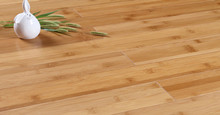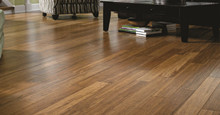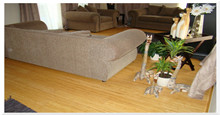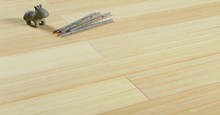Posted on 2017-7-28 8:00:57
While building a new house or refurnishing an old one, the one thing most people tends to overlook is the flooring. Interestingly the floor of a house gives away a lot about the home and its owners. A clean and elegant floor is something every homeowner prides themselves on and strives for. For years hardwoods has been the popular choice and go to material for building constructions. Owing to their immense strength and variety of colors and styles, hardwoods have been extensively used to build low cost houses, false ceilings and floors apart from other purposes. Such extensive use of hardwood has resulted in the depletion of the rainforests in South America which is a major ecological concern as hardwoods take almost 30-80 years to mature, sometimes even more. Cutting down of such old trees has proven detrimental to the environment and architects are now looking for an alternative to hardwood in stained bamboo flooring.
The plant in question is a tall perennial grass that grows naturally in large parts of Asia, Africa and South America. The modest grass grows throughout the year, matures in 5 to 7 years and is one of the toughest natural materials. The short generation cycle of the bamboo makes it the most sustainable building material. Bamboo is not just panda food anymore. It has found widespread use in flooring and construction material over the past few decades because of its sustainability and extraordinary hardness. Even though the bamboo has been widely used in China for centuries to build houses, scaffolding, furniture and even weapons, it came to the fore internationally in the last couple of decades. With people becoming more and more environmentally conscious, hardwoods are being gradually replaced by bamboo.

So what makes such a simple grass so exceptionally popular among architects and engineers? Well first of all bamboo is stronger than maple, chestnut, oak, ash, mahogany and most walnut. This means bamboo is harder than the average hardwoods available in the market. The Janka hardness scale rates the bamboo as one of the hardest natural materials just behind Brazilian walnuts and Australian buloke. Bamboo incredibly scored nearly 3000lbf on the scale which is pretty higher than commonly available hardwoods. The robust nature of the bamboo plant also makes it resistant to dust, pests and insects. During manufacturing the bamboo is treated in a solution of boric acid and water to eliminate any insects or sugar in the bamboo shoots. This process further ensures that the bamboo inhibits future mould growth or insect infestation. Stained bamboo flooring has a reputation for being able to hold its ground against all kinds of scratches, dents and stains. Stains can be easily cleaned with the help of a clean wet cloth. Scratches are rare and even if it occurs it is mostly on the upper surface and not the surface of the bamboo. Retouching your bamboo floor is one way to get rid of scratches and keep your floor looking as good as new. Bamboo is also impervious to moisture but too much exposure to moisture for a long period of time can damage the bamboo or any other natural material for that matter. However, the naturally hardy bamboo means your floor can take a beating and still look stunning.
This is another great quality of bamboo floors. Stained bamboo flooring offers the same aesthetic appeal as any hardwood floor. Do not let this unassuming plant fool you. The feel of bamboo beneath your feet is great and it provides ample warmth to your room. The natural grainy texture of the bamboo lends your floor a trendy and artistic touch. With an array of stains and diverse styles on offer, stained bamboo flooring offers a luxurious experience at half the cost of any decent hardwood.
Yes, generally bamboo flooring costs way less than hardwood flooring. On top of that it is much easier to install a bamboo floor than hardwood floor. Bamboo floor can be nailed or glued down like hardwood or it can be set down on foam as a floating floor. You can even do it yourself. The bamboo fits perfectly ensuring minimal wastage and easy fitting. Not only does it make installing your floor easier but also makes removing the same floors a lot painless.
So the bamboo is stronger than hardwood, last longer than hardwood and is eco-friendly in nature unlike hardwood. All these make bamboo flooring the best alternative to hardwood.



